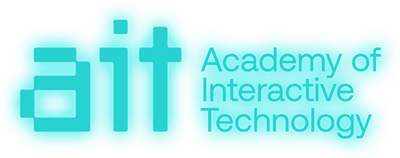IT Courses
Bachelor of Information Technology (Mobile Applications Development) CRICOS 080428J.
Join the future of tech and explore cutting-edge IT courses at AIT. Building a career in the tech sector right now will set you up for well-rewarded global career opportunities for decades to come. Our IT courses at AIT will prepare you for a career in many fascinating fields. Graduate with a broad range of skills, and work as a qualified web developer, building your own sites, games or apps from scratch; or take on interesting IT roles at global companies.
- 27 May 2024
- 16 September 2024
- 3 February 2025
- Requirements
- Industry-Ready
- Student Showcase
- Our Educators
- From the blog
How to apply
Here at AIT, we care about your creativity, not your ATAR. If you’re a domestic student, then you can apply directly to AIT or via UAC and VTAC. If you’re an international student, then our registered agent partners can help you to organise everything you’ll need for your AIT application and your application to study in Australia.
Find out exactly what studying at AIT will cost, with our transparent list of student fees plus learn more about the generous scholarships for both international and domestic students.
Industry-Ready Graduates
We take your professional preparation very seriously – and here are some of the meaningful ways we do it.
Skills That Matter
- Industry-specific professional skills embedded within each subject during your IT studies.
- Key employability skills build progressively throughout the program as you develop complex professional capabilities; e.g. first read and understand a brief, then later present completed projects to a panel of IT industry experts.
Professional Portfolio-Building
- Across all our programs we have designed real world project-based assessments that can be repurposed into a professional portfolio on graduation.
- Some portfolio items follow your creative visions, others follow set client briefs – portfolio diversity that will set you apart.
Career Support
- We have dedicated staff with robust industry knowledge ready to help you plan your career, guide you in the future direction of tech, help with your CV, social media presence or where to find work.
Bachelor Program Industry-Ready Inclusions
The third and final year of all AIT IT courses will focus strongly on the fundamentals of preparing you for employment in the tech industry of your choice, whether that’s in web development, communications technology, as a cyber security professional, in computer science or technical support.
We’ll teach you what the IT industry is looking for and guide you in every aspect of transitioning from study to the workforce for an exciting career to look forward to. We’ll ensure you’re equipped with the right soft skills, practical skills, practical experience and project management skills you’ll need to succeed.
We’ll also provide opportunities for you to showcase your work to AIT’s industry connections and teach you how to pitch and present in a professional working environment.
Image reference: ‘Nathalia Andrade presenting at ACS offices’
Ourstudentsconstantlyblowusawaywiththeworktheyproduce.Watchourbragreel!Ourstudentsconstantlyblowusawaywiththeworktheyproduce.Watchourbragreel!
Dive down the rabbit hole and explore more student work!
Our Learning Design Team
At the basis of everything that happens in the tech and interactive media world is design – how to design a project, a game, a film shot – everything. It’s the same with education.
When we are building your program we make sure we have the best designers on the job. That is why we have done what so few providers have done; we have invested in an in-house Learning Design Team, a group of highly qualified educators and designers, making your IT course content engaging, accurate, current, intuitive and enjoyable.
Studying should feel seamless, and your focus should be on what you want to learn, not the tech functionality. We make sure this is apparent when you invest in AIT for your learning.
Want to learn more about our educators?
What'snext?What'snext?
Not sure what to explore next? Visit our connect page and choose your own adventure. Talk to someone about your study options, book a campus tour and have a look around, chat with a current AIT student or get started on your application.
